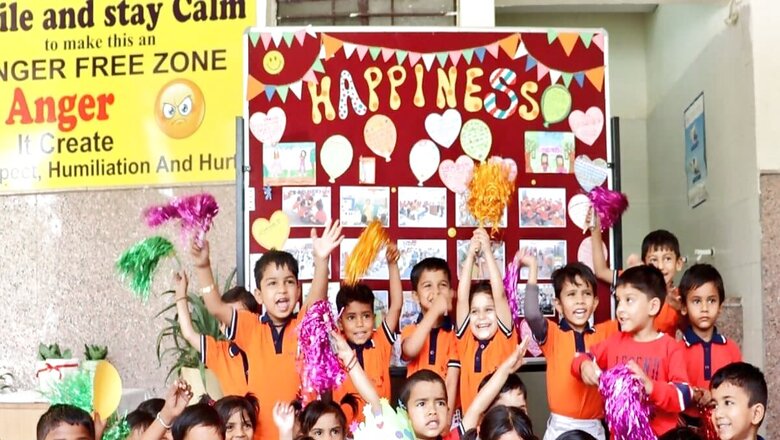
views
We have come a long way concerning our awareness, knowledge and understanding of mental health. Once considered taboo and subject to ridicule, we have come to a place where it is more openly talked about and relatively taken seriously.
Mental health has gained prominence and entered public discourse. Its journey till now and forward has an important relationship with our education sector. As we talk about the intersectionality of mental health and education, it is pertinent to mention that both of them can and should have a positive impact on one another. Each one can be employed for the betterment of the other. In this regard, an important tool that can be employed is positive psychology.
The contemporary landscape of Indian education presents a unique challenge, with students facing a sea of choices, uncertainties, and a rapidly evolving world. Equipping them with the tools to navigate these complexities requires a new approach. While traditional preaching methods aim for academic knowledge and skill development, they often overlook fostering emotional well-being and a sense of purpose. On the other hand, the focus on mental health in our educational institutes is more or less restricted to counselling facilities, where the major focus is on catering to the effects of mental health.
In such a setup, positive psychology emerges as a powerful tool to address this gap. Beyond mere counselling services, it advocates for cultivating a culture of strength-focused interventions within schools. It can create a space for academic discourse, aligned with practices that nurture gratitude, resilience, grit, and mindfulness in young minds. Positive psychology not only provides students with a worldview that emphasises well-being and personal growth, but it also cultivates good mental wellness proactively, rather than solely addressing mental health concerns after they arise.
The rise in mental health concerns among young people demands a proactive response. In today’s atmosphere of intense competition, academic pressure, and constant social comparison, traditional support systems often fall short. Positive psychology offers a preventative strategy by fostering emotional resilience and a sense of purpose in students. This approach equips students to navigate the challenges of adulthood, such as stress, uncertainty, and social pressure, before they become overwhelming. This differs from our current reactive approach, where students often seek help from counselling services only after experiencing significant distress.
According to a data, mental health and related issues affect about 51 per cent of school-aged children and adolescents. As per another report by UNICEF, one in seven young people between the ages of 15 and 24 in India experience poor mental health, including symptoms of depression and disinterest. What makes this situation even direr in a country like India is the scarce awareness about mental health among the masses, compounded by limited access to mental health facilities, especially in rural areas.
The scope of positive psychology extends beyond the simple practice of managing mental health disorders. Its core focus focuses on developing strengths and nourishing good emotions like hope, optimism, and appreciation. This enables students to not only deal with problems but also prosper in their pursuits.
Positive psychology must be systematically introduced into our educational system, rather than being a one-time intervention. For this, we must include positive psychology principles into existing subjects. Alternatively, create separate courses on character strengths, goal planning, and mindfulness. Activities such as gratitude journaling, identifying personal strengths, and practising mindfulness exercises can be incorporated into the regular school day.
This intervention should not be solely focused on the students. It has to include the teachers as well. Providing teachers with the required training and necessary tools is critical for successful implementation. Workshops and professional development programmes can help them learn and share these skills. Positive psychology must extend to educators as well. Investing in their well-being through stress management and positive psychology practices can have a good impact on the entire school community.
While a national policy on positive psychology in educational institutes does not yet exist, promising developments are emerging. One significant example is the Happiness Curriculum, initiated by the Delhi government in its schools in 2018. This curriculum, also known as the “Anand Curriculum,” aims to promote emotional well-being and character development in students from nursery to grade eight. It represents a substantial shift in educational focus, moving beyond academics to prioritise students’ mental and emotional well-being—core principles of positive psychology.
The Happiness Curriculum includes activities such as mindfulness exercises, storytelling, and cooperative games. These activities address various areas of well-being, including developing happy emotions, social-emotional abilities and increasing self-awareness. At the same time, organisations such as the National Positive Psychology Association (NPPA) are promoting the use of positive psychology ideas in India. They provide training and tools for both educators and parents.
Given the current state of our education system and the factors impacting mental health, positive psychology has immense potential to transform education in India while simultaneously promoting better mental well-being. By fostering a culture of well-being and equipping students with essential life skills, we can empower them to navigate challenges and thrive in their endeavours. However, shifting from an emphasis on academic performance to a holistic focus on well-being requires a collaborative effort among educators, policymakers, parents, and students.
Prof (Dr) Pulkit Khanna is Dean, Jindal Institute of Behavioural Sciences, at O.P. Jindal Global University. Views expressed in the above piece are personal and solely those of the author. They do not necessarily reflect News18’s views.



















Comments
0 comment